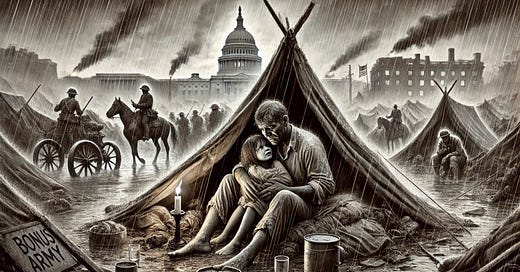You hear the rain before you feel it. At first, it’s like static on an old radio—soft, scratchy, harmless. Then it starts to fall harder, sliding through the patched canvas above your head, tracing a cold line down your spine. The water finds the seams first, then the holes, then everything else. You shift your daughter off your chest and pull the burlap blanket tighter around her. She’s still coughing. Still warm. That’s something.
Your wife is crouched at the far end of the tent, holding one of the boy’s socks over a candle. The flame dances. The sock doesn’t dry.
“Don’t waste the wax,” you say.
She doesn’t look up. “It’s already wasted.”
The boy is outside again, squatting in the mud, counting worms. He does that when he’s hungry. You don’t stop him. Better for him to think about numbers than food.
The tin pot beside you holds exactly two spoonfuls of last night’s beans. Enough to lie about. You ladle half into a tin cup and hand it to your daughter when she stirs. She gulps it down and hands it back without a word. You wipe her chin with your sleeve and set the cup near the flap where the rain drips slow and steady.
Across the row of tents, a man shouts, “Congress votes today!”
The government said your bonus was coming. Not now—but one day. “One day,” they said—as if it doesn’t matter! The war ended in 1918. This is 1932! And they’re telling us 1945. Not good enough. It’s too short a leap from “one day” to “never.”
Like all of these other men and families camped here, your sacrifice was on demand—when they needed you, but once you fulfilled your duty, they failed to fulfill theirs. And you need their help now as much as they needed yours during the war.
Unlike the first times Congress voted. Nobody cheers this time. There’s no indication anything will change.
Keep reading with a 7-day free trial
Subscribe to Bathroom Breaks & Bedtime Tales to keep reading this post and get 7 days of free access to the full post archives.




